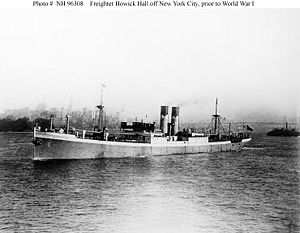USS Howick Hall (ID-1303)
 SS Howick Hall in New York Harbor prior to the entry of the United States into World War I. | |
| Career (United States) | 100x35px |
|---|---|
| Name: | USS Howick Hall |
| Namesake: | Previous name retained |
| Builder: | William Hamilton Company, Port Glasgow, Scotland |
| Launched: | 1 October 1910 |
| Completed: | 1910 |
| Acquired: | 24 August 1918 |
| Commissioned: | 24 August 1918 |
| Decommissioned: | 13 March 1919 |
| Fate: | Returned to owners 13 March 1919 |
| Notes: |
In service as: *British commercial cargo ship SS Howick Hall 1910-1914 *American commercial cargo ship SS Howick Hall 1914-1917 *U.S. Army cargo ship Howick Hall 1917-1918 *American commercial cargo ship SS Howick Hall 1919-1929; *American commercial cargo ship SS Doverden 1929-1930 *British commercial cargo ship SS Doverden 1930-1935 *Italian commercial cargo ship SS Ircania 1935-1941 *U.S. Maritime Administration ship SS Raceland 1941 *American commercial cargo ship SS Raceland 1941-1942 Sunk 28 March 1942 |
| General characteristics | |
| Type: | Cargo ship |
| Displacement: | 8,097 tons |
| Length: | 413 ft (126 m) |
| Beam: | 51 ft 6 in (15.70 m) |
| Draft: | 25 ft 11 in (7.90 m) |
| Propulsion: | David Rowan and Company (Glasgow, Scotland) triple expansion steam engines, two shafts |
| Speed: | 10 knots |
| Complement: | 91 |
USS Howick Hall (ID-1303) was a cargo ship that served in the United States Navy from 1918 to 1919.
Contents
Construction and service, 1910-1918
Howick Hall was built as the commercial cargo ship SS Howick Hall in 1910 at Port Glasgow, Scotland, by the William Hamilton Company. In 1914 she was sold to the United States Steel Products Company of New York City. She was sold to the Isthmian Line in 1915.
In September 1917, the United States Army acquired Howick Hall for use as a cargo ship during World War I.
The U.S. Navy acquired Howick Hall from the U.S. Army on 24 August 1918. Assigned Identification Number (Id. No.) 1303, she was commissioned at Baltimore, Maryland, the same day as USS Howick Hall with Lieutenant Commander Gust E. Jonsson in command.
Assigned to the Naval Overseas Transportation Service, Howick Hall loaded cargo at Baltimore and joined a convoy at New York City. From there she steamed to St. Nazaire, France, which she reached on 30 September 1918. She discharged her cargo and returned to Baltimore, where she arrived on 31 October 1918. It proved to be her only wartime voyage in U.S. Navy service, as World War I ended on 11 November 1918 before she next put to sea.
Howick Hall's second and final voyage in U.S. Navy service began at Newport News, Virginia, where she loaded cargo for Le Verdon-sur-Mer, France, on 25 December 1918. From there Howick Hall went to Bassens for fuel, and on 3 February 1919 departed for the United States. However, a case of spinal meningitis in her crew necessitated her stopping at Bermuda on 21 February 1919. Ship and crew were placed in quarantine and denied communication with the island of Bermuda until she departed for Newport News on 25 February 1919.
After calling at Newport News, Howick Hall arrived at Baltimore on 5 March 1919 and decommissioned there on 13 March 1919. She was returned to her former owners the same day.
Commercial service, 1919-1942
Once again SS Howick Hall, she returned to commercial service. She was renamed SS Doverden in 1929, then sold in 1930 to the Exeter Shipping Company of London, England. In 1931 she was sold to the McAllum Steamship Company of London, then in 1932 to the Lambert Brothers of London, then again in 1935 to H. Constant of London.
Doverden was sold for scrap in 1935, but was saved from scrapping when Ditta Luigi Pittaluga Vapori of Genoa, Italy, purchased her and placed her in service as the Italian commercial cargo ship SS Ircania. In 1937 she was sold to the S.A. Cooperativa di Nav Garibaldi of Genoa, and served as an Italian supply ship in the Second Italo-Abyssinian War of 1935-1936.
The U.S. Maritime Commission acquired Ircania on 24 June 1941 at Jacksonville, Florida, and renamed her SS Raceland. The Maritime Commission transferred Raceland to the South Atlantic Line on 31 December 1941. In South Atlantic Line service early in World War II, Raceland joined Convoy PQ-13, which departed Boston, Massachusetts, for Reykjavik, Iceland, and then continued to Murmansk in the northern Soviet Union.
Loss
Raceland was in Convoy PQ-13 on the Reykjavik-Murmansk leg of its voyage when she was bombed and sunk by German bombers south of Bear Island on 28 March 1942 at position 72° 40' N., 20° 20' E. Two of four lifeboats her crew launched were lost in heavy seas. The remaining two finally reached the coast of Norway, after constant rowing, with 22 men dead from the cold.
References
- This article includes text from the public domain Dictionary of American Naval Fighting Ships. The entry can be found here.
- Department of the Navy: Naval Historical Center Online Library of Selected Images: Civilian Ships: S.S. Howick Hall (British Freighter, 1910). Later USS Howick Hall (ID # 1303), 1918-1919
- NavSource Online: Section Patrol Craft Photo Archive: Howick Hall ID 1303)
- Pages with broken file links
- Wikipedia articles incorporating text from the Dictionary of American Naval Fighting Ships
- Unclassified articles missing geocoordinate data
- All articles needing coordinates
- World War I cargo ships of the United States
- Ships built in Scotland
- 1910 ships
- Shipwrecks in the Arctic Ocean
- Unique cargo ships of the United States Navy
- Maritime incidents in 1942
